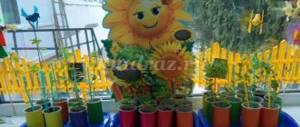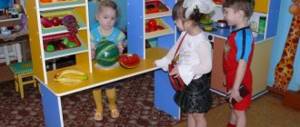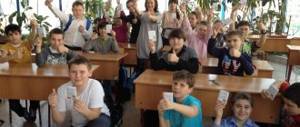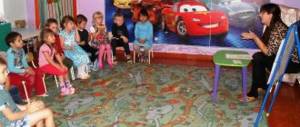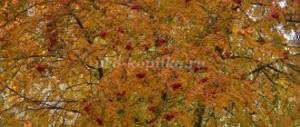Holidays and leisure time in the system of environmental education for preschool children
Ulyanovsk Pedagogical College No. 4
Course work
on the topic: “Holidays and leisure activities in the system of environmental education for preschool children”
Performed:
correspondence student
group
2
PLAN
Introduction………………………………………………………………………………2
1. Theoretical foundations of organizing environmental holidays and leisure activities………………………………………………………………………………4
1.1 the uniqueness of environmental holidays and leisure activities in preschool childhood and their place in environmental education…………………………………4
1.2 preparing the teacher for environmental holidays and leisure activities………………………………………………………………………………6
1.3 content of environmental holidays and leisure activities for preschoolers...9
1.4 methodology for conducting environmental holidays and leisure activities……..11
2. Carrying out environmental holidays and leisure activities with children of senior preschool age…………………………………………………………..14
Conclusion…………………………………………………………………………………..15
Literature………………………………………………………………………………..16
Appendix…………………………………………………………………………………..17
2
Introduction
The educational value of nature is difficult to overestimate. Communication with nature has a positive effect on a person, makes him kinder, softer, and awakens better feelings in him.
The initial stage in the formation of a system of environmental education for youth is the preschool period. During this period, a positive attitude towards nature, towards yourself and the people around you is formed.
For preschool pedagogy, environmental education is a new direction that appeared at the turn of the 80s and 90s and is currently in its infancy. Environmental education of preschool children is an introduction to nature for children, which is based on an ecological approach, in which the pedagogical process is based on the fundamental ideas and concepts of ecology.
Modern environmental education of preschoolers is characterized by the need to develop a consciously correct emotional attitude of children towards nature.
In a preschool institution, children are introduced to nature and the changes that occur in it at different times of the year. On the basis of acquired knowledge, such qualities as a realistic understanding of natural phenomena, curiosity, the ability to observe, think logically, and have an aesthetic attitude towards all living things are formed.
The influence of nature on a child is enormous: it greets the baby with a sea of sounds and smells, secrets and riddles, makes him stop, take a closer look, and think. The beauty of the surrounding world gives rise to a feeling of attachment to the place where you were born and live, and, ultimately, love for the Fatherland.
An integrated approach to environmental education allows preschool teachers to use different forms of education, including integrated classes, observation cycles, targeted walks in nature, environmental health hikes, environmental holidays and leisure activities, environmental events, game-based learning situations, experiments, and problem situations. and etc.
The main form of environmental education for children in preschool educational institutions is classes in which children learn about the huge and interesting world of nature. But the most emotional and fascinating experiences of nature are holidays and leisure time.
Holidays and entertainment are the most natural and joyful type of activity that shapes the character of children; they allow children to develop a wide variety of positive qualities: independence, goodwill, cheerfulness, initiative, creativity, facilitate the perception of the problems and knowledge presented, introduce them to collective experiences, and fill children’s lives. bright colors. The pedagogical meaning of holidays and leisure is to evoke in children a positive emotional response to natural content. In the process of holidays and entertainment, on the one hand, the skills and abilities acquired in classes are consolidated, and on the other hand, the need for learning new things, broadening one’s horizons, joint actions and experiences deepens.
1. Theoretical foundations for organizing environmental holidays and leisure activities
1.1 The originality of environmental holidays and leisure activities in preschool childhood and their place in environmental education
The importance of holidays and leisure time in the system of environmental education of children is difficult to overestimate.
Ecological leisure is another form of organizing the activities of preschool children. Ecological leisure includes: organizing theatrical activities, during which children stage literary works of a natural history character they already know, and also develop their own scenarios for environmental fairy tales, literary and musical entertainment dedicated to the seasons. The pedagogical meaning of environmental leisure activities is to evoke in children a positive emotional response to their “natural” content. They are held regularly, their topics are proposed by both the teacher and the children.
Ecological holidays are an expanded version of environmental leisure. At this stage, special attention is paid to the use of poetic and musical works, reproductions of paintings by landscape artists in scripts. All this enhances the child’s impressions of the beauty and uniqueness of nature. The positive emotions received during the holiday give rise to attitudes and affect the child’s personality as a whole.
As many studies show, the harmonious development of a child’s personality is not possible without an emotional attitude to the world around him. In order to overcome the discrepancies between knowledge of moral norms and the actual behavior of children, it is necessary that not only an understanding of a particular situation arises, but also a positive attitude towards the event.
Emotional development, “education of feelings” of children is carried out under the influence of adults, who, as it were, set the child a standard of emotional attitude towards the environment, including nature.
Organizing and holding environmental holidays is one of the most interesting forms of environmental education for preschool children, as it can evoke a positive emotional response to their natural content among participants and spectators.
Since holidays and entertainment are the most natural and joyful type of activity that shapes the character of children, they allow children to develop a wide variety of positive qualities: independence, goodwill, cheerfulness, initiative, creativity, facilitate the perception of the problems and knowledge presented, introduce them to collective experiences, fill children's life with bright colors. In the process of holidays and entertainment, on the one hand, the skills and abilities acquired in classes are consolidated, and on the other hand, the need for learning new things, broadening one’s horizons, joint actions and experiences deepens.
In our opinion, the most complete concept is the definition proposed by Deryabo S.D., Yasvin V.A.: “An environmental holiday is a form of environmental education, which is a set of environmental events dedicated to a certain date.”
This issue was dealt with by such researchers as Deryabo S.D., Yasvin V.A., Zatsepina M.B., Molodova L.P., Nikolaeva S.N., Ryzhova N.A. and etc.
Ecological holidays provide great educational opportunities and have a positive effect on the emotional development of preschool children. The emotions that the child received from the holiday also contribute to social and moral development. With the help of stage images, children talk about the rules of behavior in nature not only to their peers, but also to adults, which is very important for raising the general level of people’s ecological culture. Ecological holidays deepen the assimilation of environmental knowledge, knowledge about nature, its cause-and-effect relationships, which contributes to the emergence of emotional assessment. Holidays influence the accumulation and updating of environmental experience of both children and adults.
Since the role of holidays and entertainment is to have a strong impact on the emotional sphere of a child’s personality, what is important in such holidays is not so much the reproduction of familiar pieces of music, poems, games, or guessing riddles on natural themes, but rather the involvement of children in experiencing events, in awareness of environmental problems, understandable to children. As the plot of a fairy tale or a separate episode plays out for children, try to evoke in children the experience of humane feelings, sympathy, and a strong desire to help the characters or solve a problem situation that has arisen.
The child’s experience of events, various situations, accumulation of experience in solving environmental problems in accordance with the role assumed is the basis for the subsequent choice of the correct methods of behavior in similar or similar situations.
Among the important factors influencing environmental education during holidays and leisure time is the child’s activity in a group of peers. Here the child demonstrates his abilities, self-affirmation, performs actions in accordance with moral standards, and understands more deeply how to act in a particular case.
The pedagogical meaning of environmental holidays is to evoke in children a positive emotional response to their natural content. Emotions give rise to attitudes and affect the personality of the preschooler as a whole, so it is recommended to hold holidays regularly, ending the season or any meaningful block with them.
During environmental holidays, children not only receive positive emotions, they develop basic ecological ideas about nature and an understanding of the importance of protecting the environment; a humane and active attitude towards nature, expressed in a careful and caring attitude towards living beings, as well as awareness of the fulfillment of certain standards of behavior.
1.2 Preparing the teacher for conducting
environmental holidays and leisure activities
Organizing, preparing and conducting environmental holidays and entertainment with preschool children is an important pedagogical task.
The purpose of such holidays is to sow and cultivate in a child’s soul the seeds of love for the native nature, home, family, history, and culture of the country created by the work of relatives and friends.
Let's consider the forms and methods of working with teachers at each stage of organizing, preparing and conducting environmental holidays and entertainment.
Stage 1. Preparatory
1. Selection and systematization of materials in the teaching room to help educators work with children.
2. Exhibition of literature on this topic for teachers.
3. Discussion and approval of the plan for holidays and entertainment at the pedagogical council. (Include in annual plan).
4. Making and purchasing gifts and souvenirs (together with teachers).
5. Diagnostic questionnaire to identify the level of readiness of teachers to conduct holidays and entertainment on an environmental theme.
| Readiness indicators | I know, I speak fluently | I own it, but I don’t always know it | I don't know, I don't know |
| 1. Understanding the tasks of environmental education and upbringing | |||
| 2. Knowledge of methods of environmental education and training | |||
| 3. The ability to take on the role of host at a party | |||
| 4. Ability to develop a scenario for holidays and entertainment | |||
| 5. Ability to organize children at a party | |||
| 6. Ability to establish friendly relationships with children | |||
| 7. The ability to attract parents to participate in the holiday | |||
| 8. The ability to take on the role of any character | |||
| 9. Ability to decorate a music room in accordance with the theme of a holiday or entertainment | |||
| 10. The ability to conduct self-analysis of the holiday and entertainment |

